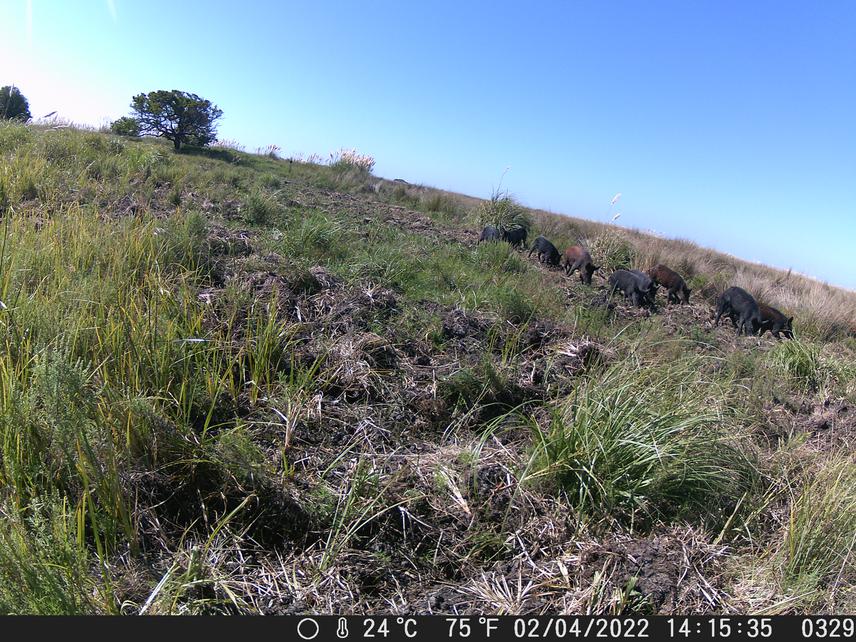Social media video featuring the project.
Wild boars disturbing an area
11 Jun 2020 Mar Chiquito UNESCO Man and Biosphere Reserve, Argentina, Central and Latin America Mammals | Biodiversity | Habitats
The aim of this project is to evaluate the effects of the exotic invasive wild boar (Sus scrofa) in Argentinean salt marshes. With the results that we expect to obtain, we will understand wild boar impacts on salt marshes, wicj will allow to anticipate future damage in a context of increased antrophogenic stressors (as increases in population size and land reclamation). These results will be substantial for the conservation of Argentinean salt marshes, since it will be possible to know how wild boars affect the system and how resilient is the system to these disturbances, making possible to identify sensible species/habitats/communities that should be specially protected.

Wild boars feeding
One of the terrestrial exotic species that has concentrated considerable attention due to its negative impacts on conservation efforts is the wild boar, Sus scrofa. The impacts of the wild boar in its introduced and native ranges affect all components of the ecosystem. Particularly in South-eastern coast of Buenos Aires province, wild boars are increasing their population and, hence, salt marshes are being more threatened. Wild boars are affecting salt marsh vegetation over large areas by uprooting plants creating bare patches with modified topography (i.e. from flat to heterogeneous surface). Salt marshes are strongly affected by the action of other native herbivores that disturb the sediment, and also their recovery is extremely slow, hence it is particularly relevant to study the effect of wild boar disturbance in these ecosystems.
A combination of field samplings and experiments will be used to study the effect of the wild boar on patch dynamics, biodiversity (plant, arthropods and birds) and ecosystem functions (e.g. nitrogen fixation, denitrification, decomposition and forage quality). Both, samplings and experiments, will be conducted in three Buenos Aires coastal salt marshes. The analysis of different species (plant, arthropod, and vertebrate abundance and richness) under different wild boar disturbed conditions will provide useful information to identify species and/or areas particularly sensitive to disturbance. It will let us identify which species are favoured and which are negatively affected by wild boars over time. On the other hand, different ecosystem functions will be quantified to evaluate the effects of wild boars beyond diversity. Nitrogen fixation and denitrification rates may give an idea of the capacity of the system to recycle nutrients and the impact of wild boars on this dynamic.
Effects mediated by altered nitrogen cycle will likely be evident on the long term, and thus, identifying their potential drivers is essential to anticipate potential changes in ecosystem functioning. Decomposition rates are a key step for carbon accumulation in marshes, and it may change because of the removal of sediment that can lead to flooding and alterations in soil structure.
Forage quality is important since changes in primary producer quality may lead to change across the food web. Thus, the present study will provide crucial information about the effect of wild boars in coastal salt marshes of the Buenos Aires coast. This information will be essential in order to identify sensitive species/environments and to quantify their environmental damage to optimize management and conservation efforts.
Social media video featuring the project.
Wild boars disturbing an area